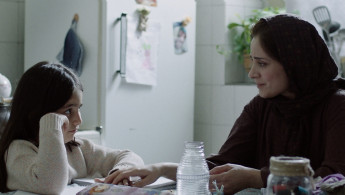Ballad of a White Cow: An Iranian woman's quest for justice in a wretched system
The above quote, taken from Behtash Sanaeeha and Maryam Moghaddam's directors' statement, poignantly and poetically describes the film's main theme: mourning the death of an innocent man.
The feature, produced by Gholamreza Moosavi (Pedram Alizadeh's Drought and Lie) and Etienne de Ricaud (Esmaeel Monsef's The Charcoal), was unfurled in the main competitive section of this year's virtual edition of the Berlin International Film Festival, held between 1-5 March 2021.
The story of the drama, written by the directing duo along with Mehrdad Kouroshnia, centres on Mina (played by Moghaddam herself), a struggling single mother of a deaf-mute, seven-year-old daughter, Bita (Avin Poor Raoufi) and a milk-packing factory worker, who is devastated to learn that her husband Babak was executed a year earlier for a murder he didn't commit.
After admitting Babak's innocence, Iranian authorities offer Mina the prospect of being "compensated the full price for an adult male."
Of course, the widow soon realises that the financial compensation is not enough to remove the stain from her husband's name.
 |
After admitting Babak's innocence, Iranian authorities offer Mina the prospect of being 'compensated the full price for an adult male' |  |
Necessarily, she begins a silent battle against a cynical, bureaucracy doomed system. She takes out an ad in the newspaper, demanding a public apology in a desperate attempt to restore her husband's reputation.
Yet as luck would have it, when her money runs out, she is greeted by a mysterious stranger called Reza (Alireza Sanifar) who promises to repay the debt owed. Reza shows great generosity and provides her a nice apartment after she and Bita have been evicted.
He gradually gains the widow's trust, who seems to develop feelings for him.
However, the man hides a dark secret as he was one of the judges condemning Babak to death. The film reveals Reza's identity from its early stages; nevertheless, Sanaeeha and Moghaddam invite the spectators to focus on Mina's path and her tiny beacon of hope.
To this end, the film is successful in bottling up the feeling of powerlessness experienced by a widow, who is not only going through an unbearable emotional turmoil caused by her recent loss, but is also a victim of the patriarchal pressures imposed by Iran's conservative society and by her family, a system that seeks her marriage to her brother-in-law (Pourya Rahimiam).
In particular, the man played by Rahimiam warns her that his father is willing to sue her as an incompetent mother and asks for a cut of the payment in exchange for their silence.
The absence of a score, a preponderantly static, rich in long takes camera work as well as the usage of a limited colour palette of whites, blacks and greys (courtesy of director of photography Amin Jafari) effectively enhance such feeling.
The characters are often framed symmetrically, move within a rather limited area and appear caged, ready to confront each other. It's a brutal staging choice, and at times discouraging for the viewers, as it contributes to slow down the narrative pace of the piece.
However, it is the result of Sanaeeha and Moghaddam's crystal clear decision to focus on Mina's silent battle and composure, with no frills.
Furthermore, it does not impede the filmmaking duo to gift the viewers with visually astonishing scenes. In particular, one of them depicts the two lead characters sitting on a balcony and conversing, while almost fully covered in darkness and barely illuminated by the apartment's lights on behind them.
 |
Ballad of a White Cow is a touching account of an Iranian woman's limited freedom following the loss of her husband |  |
All in all, Ballad of a White Cow is a touching account of an Iranian woman's limited freedom following the loss of her husband.
The film's spartan mise-en-scène proves to be an apt choice, making Mina's invisible "cri de coeur" plain to see on screen and easier to realise for foreign audiences.
Commendably, Moghaddam's performance is measured, credible and never overacted.
With her gentle gestures – such as putting on a scarlet lipstick or removing her hijab – and yearning looks, she is the cornerstone of a well-cast ensemble of actors, who make up for the narration's occasional slowdowns.
The recurring vision of the titular computer-generated "white cow" standing in the midst of prison barracks and between two gender-separated rows of men and women, seems an obvious religious metaphor of the two lead characters' sacrificed lives – one forced to cope with a devastating truth and pull herself together to protect her daughter, the other devoured by an immense sense of guilt and probably seeking redemption. And that's all this picture needs to stand out from the crowd.
Davide Abbatescianni is an Italian Film Critic and Journalist based in Cork, Ireland.
Follow him on Twitter: @dabbatescianni



